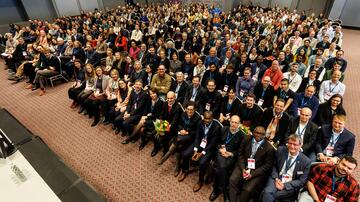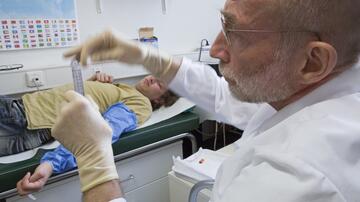Ulrike Protzer is awarded the DZIF Prize for Translational Infection Research
This year, the German Center for Infection Research (DZIF) is honouring the medical scientist and clinical virologist Prof. Ulrike Protzer for her scientific achievements. The prize is endowed with EUR 5,000.
For many years, Hepatitis B viruses have been the main research focus of Prof. Ulrike Protzer, virologist at the Technical University of Munich as well as at the Helmholtz Research Centre Munich. Her goal is to turn the insights from her research on the hepatitis B virus (HBV) into clinical application. Although there is prophylactic vaccination against HBV, more than 250 million people worldwide are chronically infected. There is no curative treatment so far. Consequently, many patients die from the consequences of the infection.
In her work, Ulrike Protzer discovered that the immune system does not have sufficient immune functionality in a chronic infection with the virus: no neutralising antibodies and almost no virus-specific T cells are found. This is where the researcher is now focusing her efforts by systematically developing immunotherapeutic strategies that can activate a B and T cell response against HBV.
As part of the German Center for Infection Research (DZIF), Protzer developed a therapeutic vaccine, called TherVacB for short, which could cover 95% of all HBV strains worldwide. In preclinical trials, the therapeutic vaccine showed high efficacy. This led to the project now being funded nationally by the BMBF and internationally in an EU consortium and soon being able to be tested in clinical phases. In addition to TherVacB, the scientist was able to develop therapeutic antibodies and a T-cell therapy to achieve targeted immunotherapy of hepatitis B, licensed out and further developed together with the biotech industry.
‘Ulrike Protzer has succeeded in transferring the insight gained from basic research into a clinically testable product and thus made a significant contribution to the translational mission of the DZIF’, said the presenters. The prize was awarded online today and will be formally presented during the annual DZIF meeting in Stuttgart in summer 2022.
A brief overview of the prize-winner
Ulrike Protzer (born in 1962) studied medicine at the University of Erlangen, where she received her doctorate in 1989. After her clinical training as a specialist in internal medicine, she joined the Centre for Molecular Medicine at the University of Heidelberg as a post-doctoral researcher in 1996, where she focused on virology. Her postdoctoral lecturing qualification (habilitation) in 2000 centred on virus-host interactions in hepatitis B viruses. Protzer established an independent research group. After two years, she moved to the University Hospital in Cologne, where she managed a young research talent group on molecular infectiology until 2007. In 2005, she became a specialist in medical microbiology and virology. At the end of 2007, she was appointed to two positions by becoming the Director of the Institute of Virology at the Technical University of Munich as well as the Helmholtz Research Centre in Munich. At the German Center for Infection Research, Ulrike Protzer currently coordinates the hepatitis research area.




